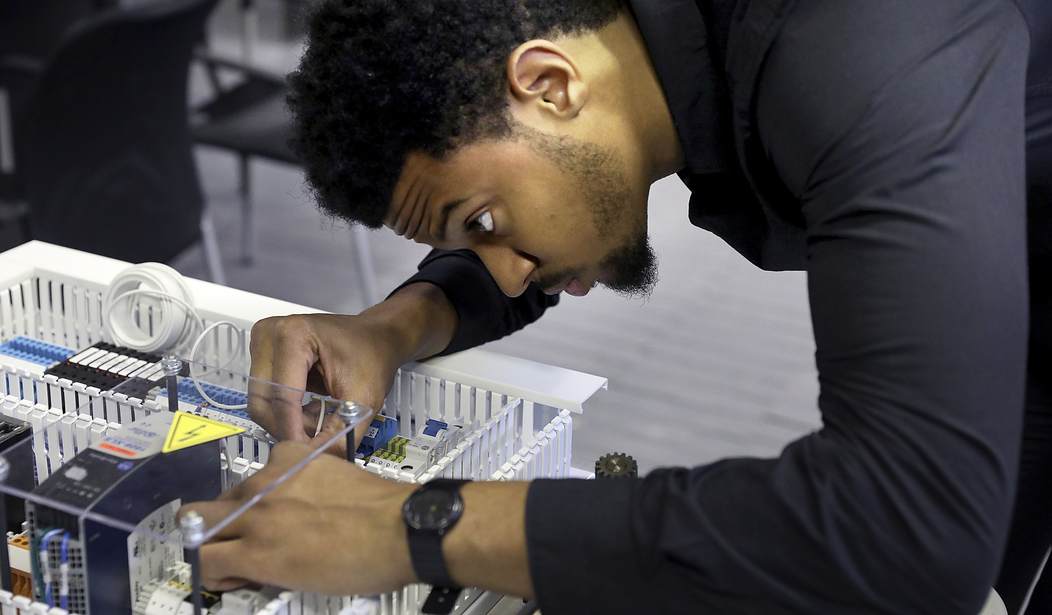Last week President Trump created through executive order the “National Council for the American Worker,” an advisory and planning body that will focus on closing the skills gap and retraining American workers to transition to the new jobs of the 21st century.
Evangelized the past few days primarily by White House senior advisor and first daughter Ivanka Trump and Secretary of Labor Alexander Acosta, the council undoubtedly is a major symbolic and practical step forward in confronting the peculiar challenges now facing millions of ordinary Americans in our rapidly transforming economy.
For many years our country has faced questions over what to do as manufacturing jobs vanished through a combination of offshoring and technology, with roughly 12.7 million in 2017 manufacturing employment compared to over 18.9 million back in the 1970s.
President Trump captured this sentiment well as he pledged during the 2016 campaign to restore hope and livelihoods to those Americans most distraught and seemingly left-behind by these immense structural shifts in our economy. That feeling manifested itself in Trump’s incredible wins in the long-seemingly-blue Rust Belt and Midwestern states of Pennsylvania, Michigan, Ohio, Iowa, and Wisconsin.
In the days since the announcement the council has earned widespread policymaker and corporate praise, earning positive statements from companies such as Apple, Wal-Mart, Boeing, Oracle, IBM, Home Depot, and more.
For many Americans the importance and challenges of job re-training are immensely apparent. Every job nowadays essentially requires some kind of skillset and for many blue-collar jobs the training was made and done precisely for the equipment, technology, and business model of the time.
With entire industries, such as coal, being uprooted and vanquished, let alone the comparatively more moderate but still enormously impactful changes affecting other industries, suddenly many workers are left with a skillset that served them well for many years but now lacks application or economic marketability.
Recommended
What are these workers to do, many of whom are in their 40s, 50s, or even later? It is both demeaning and logistically incomprehensible to expect them to enroll at a community college again with youngsters to learn a new trade, as they may have now families to care about and more complex economic circumstances to deal with that preclude the risk and cost of going back to school.
That is why corporate retraining has been the long-talked about but difficult-to-materialize hope for many of these workers. Companies know precisely what their worker and skill needs are for both the current and immediate future and thus are in the best position to provide training.
Of course, another trend in recent years has been a decline in corporations offering training, which has increased the severity of the aforementioned industry transformations and worker displacements.
And that is why President Trump’s National Council for the American Worker is stepping in at such a key time. While the organization still has to do its work in creating the precise federal government and policy plans to enact its noble aspirations, the fact that a body is being tasked with precisely that is a concrete step towards increasing policymaker and public focus on worker retraining.
When companies have real incentives, whether in public favor or in direct public-private partnership economic support, then they are far more realistically likely to actually implement worker retraining programs that find workers with skillsets that can then be remolded to our new 21stcentury technologies and business structures.
Retraining has for so many years been spoken of but due to our political back-and-forth it has fallen through the cracks as policymakers differ on precise policies, implementation, which industries to focus on, and other nit-picked items. Undoubtedly there still will be much more policy debate to come, but by hammering in a nail through the creation of the council we know there will be accountability for now actually getting retraining policies created and implemented.
President Trump pledged throughout his campaign and during his administration to stand up for the American worker and indeed it is clear that many of his policies are designed precisely for that. While the structural economic challenges that face America both now and in the upcoming years are immense and go into historically unchartered territory, through careful preparation, planning, and action we will be able to ensure our nation’s people can confront them head-on and well.

























Join the conversation as a VIP Member